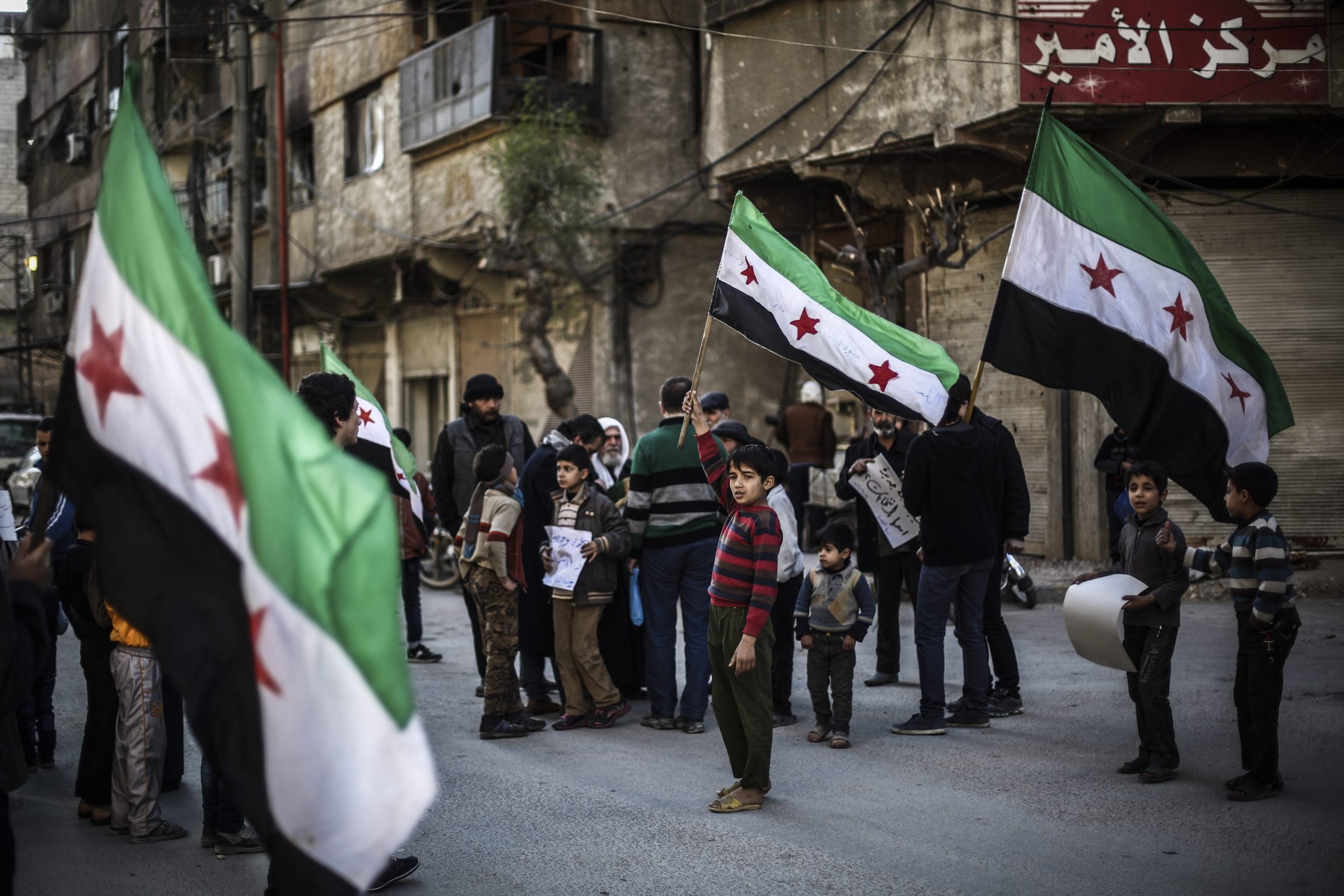
Abdulhamid Qabbani is a Syrian freelance journalist with a masters degree in peace and conflict.
During the fifth anniversary of the Syrian uprising this week, many Syrians across the country are taking to streets chanting: “One, one, one, the Syrian people are one.” The chants are reminiscent of the slogans used during the peaceful protests in 2011 at the onset of the uprising—slogans that have all but vanished during the past few years, as sound of gunfire grew louder.
The return of these popular slogans stress, yet again, the importance of our national unity. They also serve as a warning sign for those meeting in Geneva for peace talks to consider the risks of partition.
The argument for dividing the country has been advanced as battle lines have carved up the map in a de facto partition. In addition, it has become clear that no party will have a decisive military victory. Yet despite current battle lines and territorial divisions, partition is unlikely to be an effective tool in reducing the violence let alone be stable solution to the conflict. Indeed, the current war is not based or fuelled by territorial disputes; it has political root causes.
Russian President Vladimir Putin’s recent order to withdraw Russian forces from Syria could be a game changer. It is significant that the declaration of withdrawal came on the first day of the peace talks as it sends a clear sign that Moscow is not willing to continue its investment in the conflict without a wider framework for a solution. In other words, Russia may use its leverage over the Syrian regime to find a settlement to the conflict, which could come in the form of a federal model. This appears to concur with Secretary of State John Kerry’s plan B of de facto partition. Whilst Putin’s post-withdrawal plans are not clear, it is unlikely that Russia’s ally on the ground would settle for such a plan.
On the part of the Syrian regime, partition is a politically sensitive topic. The Baath Party’s political discourse is shaped by the national spirit of Pan Arabism, anti-imperialism and resistance to Israel. This makes the political option of accepting partition a costly one, which the Syrian leadership may not be ready to accept. In a televised speech ahead of the Geneva talks, Syrian Foreign Minister Walid Al Muallem underscored the regime’s rejection to negotiate a federal system.
Furthermore, the idea of partition is not favored by a large proportion of Syrians. The findings of a study published last year by the Syrian Justice and Accountability Center, indicated that almost all pro- and anti-regime respondents rejected the notion of a segregated Syria. This strong sentiment against attempts to divide the country can be tracked to underlying historical grievances in Syria. This may include the colonial legacy of the Sykes-Picot Agreement of 1916, which carved faulty borders in the modern Middle East, dividing the Levant (greater Syria) on a sectarian basis that has created a gap between national and sectarian identities.
Although views are varied on how Syria could be divided and on who would control what territories, many partition advocates envision the country divided into three main parts: Kurdish state in the Syrian northeast (Rojava region in Kurdish language), regime-led state including the capital Damascus in the South and the coastal regions in the west, and a Sunni Arab state in the central and northern provinces.
Yet practical challenges for partition in Syria include the lack of defined sectarian lines in the country. Major cities are greatly intermixed with populations from different ethno-religious backgrounds. For example, the city of Homs has a blended Sunni and Alawi population while Al Hasakah in the northeast (designated a Kurdish zone) is home to Sunni Arabs, Kurds, Yazidis, and diverse Christian communities. This diversity of ethno-religious identity is applicable, although at different levels, in Damascus and Darra in the south. This suggests that partition in Syria could result in ethnic cleansing against minority groups or large population transfers. Partition could worsen the violence and generate new grievances by creating disenfranchised populations and insecure minorities.
There’s also a lack of a permissive regional environment. The reaction of key regional countries invested in the Syrian conflict towards partition must be seriously taken into account. Turkey has announced publicly that it would not allow a Kurdish state on its southern border with Syria. Recently the country has struck positions of Syrian Kurdish YPG group to halt its advancement. The Kurdish group has sought self-administered autonomous region in the northeast of Syria. Turkey fears that having an independent Kurdish state may inflame separatist sentiment among its 15-20 percent Kurdish population.
Saudi Arabia, another key regional player, would also likely not be satisfied with partition as an outcome. One of its key objectives in Syria is to stymie the strategic partnership between Iran, Syria, and Hezbollah. Partition will not serve Saudi’s wishes if it maintains Iran’s influence in Syria.
A possible international-sponsored division of Syria into multiple statelets could mean transforming the conflict from a domestic into an interstate war. The country would be better served by listening to the calls for unity.
More Must-Reads from TIME
- Donald Trump Is TIME's 2024 Person of the Year
- Why We Chose Trump as Person of the Year
- Is Intermittent Fasting Good or Bad for You?
- The 100 Must-Read Books of 2024
- The 20 Best Christmas TV Episodes
- Column: If Optimism Feels Ridiculous Now, Try Hope
- The Future of Climate Action Is Trade Policy
- Merle Bombardieri Is Helping People Make the Baby Decision
Contact us at letters@time.com